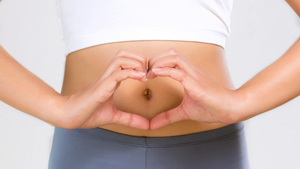
It is not uncommon to experience occasional digestive discomforts such as upset stomach, gas, bloating, heartburn, or diarrhea.
But when these problems occur more frequently, they can be disruptive and get in the way of your daily life.
Luckily, there are some diet and lifestyle changes that can improve your digestive health. Keep reading for 5 evidence-based ways you can naturally promote digestive health.
Increase fiber intake
It is pretty well-known that fiber is important for digestive health. Adequate fiber intake can improve digestion, promote regular bowel movements, as well as decrease the risk for other health conditions.
It is important to get enough of both insoluble and soluble fibers in your diet.
Soluble fiber creates a gel when absorbed, which adds bulk to the stool. Insoluble fiber attracts water to the stool, making it easier to pass. Both play an important role in improving digestion naturally.
Additionally, fiber has prebiotic properties. If you’ve heard of probiotics, then you probably also know that prebiotics provide fuel for them.
Fiber supplies food for beneficial gut bacteria, promoting a balanced gut microbiome. Research shows that a healthy balance of gut bacteria is essential to a properly functioning digestive system.
Eating a variety of fruits, vegetables, whole grains, nuts, and legumes can help you get enough fiber in your diet.
You can also take a fiber supplement like Naked Fiber to keep up with your daily requirements.
Stay properly hydrated

Hydration plays a vital role in digestive health, and it’s one of the simplest ways you can improve digestion. One of the most common causes of constipation is often caused by too little fluid intake.
For optimal digestive health, it is recommended for adults to drink about 1.5 - 2 liters of uncaffeinated fluid per day. Eating foods that have a high water content can help you reach this goal. Most fruits and vegetables tend to have a high water content.
While fluid intake, in general, can improve digestion, water reigns supreme. Start by drinking 1-2 glasses of water when you first wake up in the morning. This will get you off to a running start for the day.
Nakedade, our sports hydration drink also keeps you hydrated and replenishes electrolytes, which is especially vital if you’re sweating a lot at the gym multiple times a week.
Drink bone broth

Recent studies have found that the gelatin in bone broth plays a role in supporting healthy digestion. Bone broth is very easy to digest, and it may also encourage the proper digestion of other foods.
Much like fiber, the gelatin that occurs naturally in bone broth attracts liquids. This property allows it to bind to water in the digestive tract and move food through more easily.
Studies performed in mice have suggested that bone broth may have the ability to heal the mucosal lining. Scientists believe that bone broth can produce the same results in humans, but more research is needed to be sure.
Another component of bone broth that can help improve digestion is the amino acid glutamine found in gelatin. Glutamine plays a significant role in the regulation of intestinal permeability - meaning it helps control what goes in and what comes out of the intestinal walls. The glutamine in bone broth can promote the proper functioning of the intestinal wall.
If you’re interested in naturally improving your digestion, Naked Bone Broth is a convenient way to add bone broth to your diet daily.
Exercise regularly
If you work a sedentary job, chances are you don’t get a lot of movement throughout the day. It’s easy to forget to get up and walk around when you’re buried in your work. All that inactivity could be contributing to digestive health issues.
Participating in regular physical activity can improve digestion and reduce constipation. Studies show that people who engage in moderate exercise regularly have better digestion. You don’t have to do anything crazy or excessive to reap these benefits either.
One study showed that just 30 minutes of walking every day improved symptoms of chronic constipation. Along with gravity, exercise helps move things along in your digestive system, so taking a walk after a meal can help improve digestion.

Slow down and eat mindfully
For a long time, society has favored being busy and productive over self-care and wellness. So many people rush through eating, often at their desk while working through lunch, never taking the time to stop and allow time to enjoy.
Mindless eating can also take place while sitting in front of the television or computer with a bag of snacks.
Mindless eating can lead to overeating, which can cause bloating, gas, and other digestive issues. When we aren’t paying attention to the body’s hunger and fullness cues, it’s very easy to eat too much too quickly.
Slowing down and practicing mindfulness while eating can improve digestion and decrease the discomfort associated with overeating.
Mindful eating is the act of paying attention to all aspects of the eating experience. It encourages people to be fully present while eating a meal or snack. Studies have shown that eating mindfully can reduce negative symptoms that can occur in people with IBS and ulcerative colitis.
To practice mindful eating, try the following:
- Avoid eating while doing other things - put away your phone and turn off the TV
- Pay attention to the smell, taste, texture, temperature, and appearance of your food
- Eat slowly
- Chew your food slowly and completely
- Notice whether you feel satisfied by the food you are eating, and stop eating when you are full
Summary
Although occasional digestive upset is normal, when it occurs more frequently it can affect your quality of life. Research suggests that there are some steps you can take to naturally improve digestion and alleviate uncomfortable symptoms.
Increasing fiber intake, staying hydrated, drinking bone broth, exercising regularly, and eating mindfully are all things you can try to improve your digestive health.








